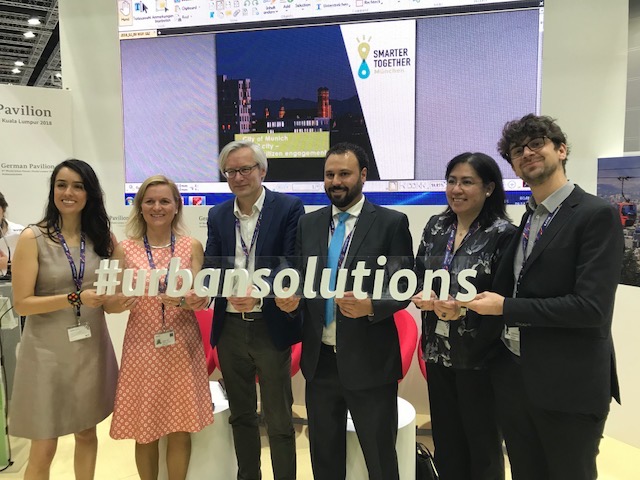The World Urban Forum 9 (WUF9), took place this February 2018 in Kuala Lumpur, Malaysia. This year’s thematic focus addressed the implementation of the New Urban Agenda (NUA) adopted at the Habitat III Conference, as well as the achievement of the Sustainable Development Goals (SDG) and the Nationally Determined Contributions (NDC) at the local level. The WUF9 made Information and Communication Technologies (ICT) and “Smart City” approaches evident as key enablers for achieving sustainable solutions. Noted during the special session “Smart Cities and the Growing Role of Frontier Technologies in Sustainable Urbanization”, UN Secretary-General’s establishment of a working group on the topic at the Chief Executives Board for Coordination, underlines its increasing relevance.
Seeking to contribute to the discussion on how to actively shape this digital transformation to indeed achieve sustainable and inclusive Smart Cities, the Federal Ministry for the Environment, Nature Conservation, Building and Nuclear Safety (BMUB) co-hosted with GIZ’s Global Program “ICT-based Adaptation to Climate Change in Cities” (ICT-A) a side event, which looked behind the scenes at the governance, capacities and viability needed by cities. BMUB’s State Secretary, Gunther Adler, opened the event, stressing the need to internationally disseminate and enrich the dialogue to develop shared normative values. During the panel moderated by Andreas Proksch, GIZ’s Head of the Department Sector and Global Programs (GloBe), a representative of the Mayor from the City of Kochi explained India’s plan to achieve 100 Smart Cities, while ICT-A’s Partner City, Guadalajara, Mexico, presented a compilation of initiatives and platforms aimed at enhancing transparency and citizen engagement, increase efficiency of administrative processes and adapt to climate change. Furthermore, the City of Munich contributed to the dialogue from its expertise, sharing German experiences around smart city labs.

Without doubt, digitally enhanced public services have great potential to also increase climate resilience in cities, providing platforms for inclusion, improving the dialog between city administrations and citizens. However, tendencies to prioritize technology ahead of citizen’s perspectives jeopardize the service’s sustainability and scalability. Believing that putting citizens – not technology – at the center of public services design is the only way to achieve truly smart cities, ICT-A’s Global Program also hosted a vibrant panel discussion in the German Pavilion under the title “Climate Smart Adaptation in Cities – Designing Digitally Enhanced Public Services with Citizens at the Core”. With welcoming remarks from GIZ’s Head of the Group “Governance and Human Rights, Mike Falke, the City of Guadalajara, represented by Mario Arauz, Head of the Department of Government Innovation, presented the citizen-centered design process carried out in the framework of activities of the ICT-A program, while engaging in a discussion and exchange of experiences with the City of Munich.
The digital transformation is leading to significant changes in how cities are understood, developed and lived. As many opportunities that leveraging data and new technology offers to foster resilient and inclusive cities, special attention must be given to challenges such as bridging the digital divide. Thus, upcoming GIZ’s global program Climate Smart Cities Network will enable a platform to further foster the international exchange and dialogue around these concerns and potentials.
